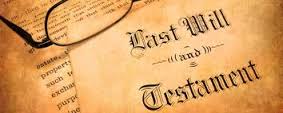
Common questions regarding Deceased Estates
- March 3, 2017
- ckadmin
- 1 Comment
Question: My Aunt has just died and she had properties & bank accounts both here and in Canada. How do I go about this?
Answer: Firstly, if the Estate exceeds $50,000 and you are the named Executor, you must apply for Probate (if she had a Will) and Letters of Administration (if she had NO Will). This would be a case of RESEAL. Reseal of Probate means a Grant by the Supreme Court of Canada ‘resealing’ probate (i.e. stamping it) to be as effective as the original Grant in Victoria. This in turn enables you to access your Aunt’s foreign bank accounts and gives you authority to sell of transfer the houses into your name.
Question: My Mum wants to create a new Will leaving everything to me and my brothers. My youngest brother is mentally disabled. What are her options to ensure my brother can deal with his money appropriately?
Answer: Where a person who is to become a beneficiary to a Will is disabled, impaired, underage or other circumstances a Testamentary Trust Will is required. This Will sets up a Trust, similar to an intangible savings account, which appoints a Trustee (in charge of his share) who disperses the money to him and caters for his needs with this money accordingly. Therefore, whilst the Trustee can give your brother funds to spend independently, he will not have access to a lump sum payment like yourself and your other brother.
Question: I am the sole beneficiary of my Uncle’s Estate. He died suddenly at 62, and I was also appointed Administrator of the Estate. He was still working at the time, and although I have received payment of all of the funds held by him in banks and superannuation, I was wondering whether I need to declare this with the Tax Office?
Answer: As your Uncle was under the age of 65 when he passed, his estate must continue to pay tax on all assets and monies owned by the estate. To do this, the Estate must apply for their own Tax File Number. Once this is received, any accountant can be consulted to complete tax returns from the time of death until the most recent financial year you received the Estate money in (30 June 2016 t0 30 June 2017). This is only if your Uncle had regular tax returns whilst he was alive, if he did not the accountant must also complete the outstanding tax returns of your Uncle from his last return until the time of his death.
Question: Can I apply for probate myself to save costs?
Answer: Anyone can apply for Probate, including all individuals. The benefit to engaging a solicitor is that they are very skilled in advertising the intention to apply for probate, drafting the relevant documents and contacting all institutions to not only ensure the documents’ accuracy, but also be able to relinquish any monies held in institutions as soon as possible. This process may be very protracted by doing it yourself, whereas a lawyer can generally finalise an Estate within 10-14 weeks after death.
Question: My solicitor informed me the Probate application for my Father’s Estate has been ‘’requisitioned’’. What does this mean?
Answer: This means the Supreme Court have found an error in the Probate documents submitted to them. Sometimes this can be in the wording of things, or a certain document required may be missing. This is typically remedied by the solicitor or yourself as the applicant swearing a separate document called an affidavit, which acknowledges the error and corrects it. After submitting this, the Court will likely grant Probate (provided there are no other errors).
Question: I already have a Will and want to change it, do I need to complete a formal document revoking my current Will to make way for my new one?
Answer: No you do not. In your new Will you are creating, there will be a clause stating ‘I revoke all former Wills’, and this will be sufficient to override your old Will. Furthermore, the most recent Will document created takes priority in any case and will therefore be the Will that is used in the event of death.
Question: If I die and no one knows I have a Will, is there a register they can look on to see if I have a Will?
Answer: No. If you die and no one is aware you hold a Will and it cannot be located, your next of Kin will apply for ‘Letters of Administration’. They will be appointed your Administrator (similar role to an Executor). This is why it is always a good idea to inform your appointed Executor that they have this role and you have made a recent Will. It is always a good idea to tell them where this document is being kept (i.e. by yourself at home, or by your solicitor).

Q: If one of the beneficiaries in a Will dies…. What happens to their share after the owner of the Will dies?
The owner of the Will wrote it in NSW and has since moved to Queensland. One of the three Beneficiaries who has since died, lived in NSW and the other two beneficiaries live in Victoria. Does this make any difference because the Will maker and two remaining Beneficiaries live in different States.